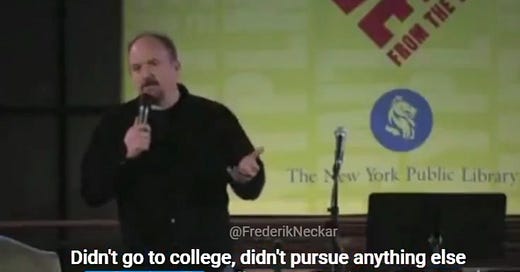The Moment that Made Louis C.K.'s Career
“In the absence of a real and present danger, the voice of fear is an almost perfect indicator of which direction to go — as long as you head the other way.” Brian Whetten
I’ve been having some wonderful reader conversations recently. One question that comes up reliably is the direction of my work which I would charitably describe as “all over the place.” It reflects my wrestling with how my life has changed, as well as the push and pull between different inner voices, a back and forth between the comfort of the known and fear of the novel.
One reader reminded me of the time when Louis C.K. shared his story at the funeral of his hero, George Carlin. C.K. talked about the darkest point of his career. I had watched it years ago but it’s so honest and raw, that it immediately sent chills down my spine again (I shared the clip on Twitter).
I remembered the technique C.K. used to unlock his creativity. But just like the message of True Detective completely changed when I re-watched it this year, I realized that I had missed the change in C.K.’s mindset which unlocked his career.
C.K. began doing stand-up right out of high school. Even though he initially bombed on stage, he kept going and learned how to write decent jokes. “I wanted it so badly that I kept trying,” he said. But where did persistence lead him? He spent fifteen years perfecting his hour-long routine. Then he realized that he had gone in circles. He hated the act he had crafted so carefully.
Also, he was not successful. “I was working places like Chinese restaurants,” he recalled. “I’d do a show in a Chinese restaurant where they don't even know there's a show gonna happen. They're there to eat.”
“Nobody gave a shit who I was, and I didn't either.”
But fifteen years is a lot of sunk cost. What else was he going to do? “Stopping now is like getting out of prison. What do you do after 15 years of stand-up comedy?” Oof. Needless to say, C.K. was in “a dark place.” But fear kept him going.
Carlin on the other hand released a special every year and “each one was deeper than the next.” C.K. admired it but it also made him despair. “I just thought, how can he do that? And it made me literally cry that I could never do that.” How could he do that?




